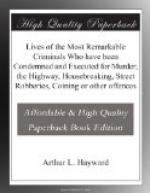The Life of JOHN WHALEBONE, alias WELBONE, a Thief, etc.
This malefactor was born in the midst of the City of London, in the Parish of St. Dionis Back Church. His parents were persons in but mean circumstances, who however strained them to the uttermost to give this their son a tolerable education. They were especially careful to instruct him in the principles of religion, and were therefore under an excessive concern when they found that neglecting all other business, he endeavoured only to qualify himself for the sea. However, finding this inclinations so strong that way, they got him on board a man-of-war, and procured such a recommendation to the captain that he was treated with great civility during the voyage, and if he had had any inclinations to have done well, he might in all probability have been much encouraged. But after several voyages to sea, he took it as strongly in his head to go no more as he had before to go, whether his parents would or no.
He then cried old clothes about the streets; but not finding any great encouragement in that employment, he was easily drawn in by some wicked people of his acquaintance, to take what they called the shortest method of getting money, which was in plain English to go a-thieving. He had very ill-luck in his new occupation, for in six weeks’ time, after his first setting out on the information of one of his companions, he was apprehended, tried, convicted, and ordered for transportation.
It was his fortune to be delivered to a planter in South Carolina, who employed him to labour in his plantations, afforded him good meat and drink, and treated him rather better than our farmers treat their servants here. Which leads me to say something concerning the usage such people met with, when carried as the Law directs to our plantations, in order to rectify certain gross mistakes; as if Englishmen abroad had totally lost all humanity, and treated their fellow-creatures and fellow-countrymen as slaves, or as brutes.
The Colonies on the Continent of America are those which now take off the greatest part of those who are transported for felony from Britain, most of the Island Colonies having long ago refused to receive them. The countries into which they now go, trading chiefly in such kind of commodities as are produced in England (unless it be tobacco), the employment, therefore, of persons thus sent over, is either in attending husbandry, or in the culture of the plant which we have before mentioned. They are thereby exposed to no more hardships than they would have been obliged to have undergone at home, in order to have got an honest livelihood, so that unless their being obliged to work for their living is to pass for great hardship, I do not conceive where else it can lie, since the Law, rather than shed the blood of persons for small offences, or where they appear not to have gone on for a length of time in them, by its lenity changes the punishment of death into




